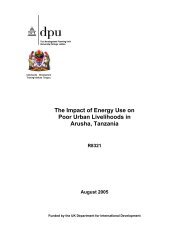EPA Review Annex Documents - DFID
EPA Review Annex Documents - DFID
EPA Review Annex Documents - DFID
You also want an ePaper? Increase the reach of your titles
YUMPU automatically turns print PDFs into web optimized ePapers that Google loves.
However, despite not having joined the FTA, the Government is playing an important role at the<br />
Trade and Customs Committee and at the level of other COMESA organs.<br />
Ethiopia is a member of the Inter-Governmental Agency for Development (IGAD) whose treaty<br />
also encompasses trade and economic relation among the Member States. The Ministry of<br />
Foreign Affairs is the focal ministry regarding IGAD but any negotiation on trade matters are<br />
handled by MoTI. IGAD has seven Member States; Djibouti, Eritrea, Ethiopia, Kenya, Somalia,<br />
Sudan and Uganda.<br />
Currently Ethiopia is negotiating to conclude an <strong>EPA</strong> (which this case study focuses on), under<br />
the auspices of the Eastern and Southern Africa (ESA) States configuration level. Regarding the<br />
<strong>EPA</strong> MoTI is the focal ministry. At the multilateral level, the country is in the process of acceding<br />
to the WTO. The country’s WTO accession process is also handled by MoTI.<br />
Regarding the WTO accession, the Government of Ethiopia applied for membership to the WTO<br />
pursuant to Article XII of GATT. A working party was also established in February of the same<br />
year in January 2003. Since then, Ethiopia has undertaken various activities aimed at securing<br />
a better understanding of the multilateral trading system and the process of accession. Among<br />
the activities undertaken by the MoTI are: various national awareness building programmes,<br />
impact assessment studies, trainings, and legal reviews. Now, there is a better understanding<br />
of the WTO system among Ethiopian stakeholders, which has paved the way for the<br />
enhancement of the accession process and Ethiopia’s full membership.<br />
The first working party meeting was held in May 2008. This meeting paved the opportunity for<br />
the government to clarify its economic policies and the measures taken over the course of<br />
several years to exercise free market economy in the country. Following this productive<br />
meeting, the Government has also been able to take several other crucial steps towards fulfilling<br />
membership requirements. Accordingly, it has submitted answers to the second round of<br />
questions that were raised by certain WTO member states and other documents that capture<br />
measures as pertaining to trade draft legislative action plan. Currently the Government is<br />
working hard in the preparation of additional technical documents yet to be submitted to the<br />
WTO and is also proactively preparing for the second working party meeting which is expected<br />
to be held shortly. Generally, Ethiopia’s accession process has been proceeding steadily.<br />
In order to effectively execute its powers, duties and responsibilities, MoTI used to be organised<br />
into 11 functional departments, four agencies, one institute and seven service giving unities.<br />
The relevant functional departments related to trade relation and negotiation (related to this<br />
case study in particular), were the Foreign Trade Relation Department (FTRD), and the WTO<br />
Affairs Department (WAD).<br />
and manufacture of plastic products. All the other manufacturing activities with ICI greater than one might<br />
not cope with the pressure of competition and could close down sooner or later. This implies that<br />
whatever contributions these manufacturing activities made in terms of value-added at factor cost,<br />
employment, and exports could be at risk. The externalities and linkages associated with the activities<br />
could also be lost. Based on current levels of operation, value-added that might be lost could be in the<br />
amount of Birr 1.2 billion or about 55.1 percent of the manufacturing GDP. About seventy-two thousand<br />
jobs or 77 percent of the industrial employment will also be at risk. The impact on Government revenue<br />
will be in the amount of the loss in personal income tax, profit tax on enterprises, customs duty on<br />
imported raw materials, and sales tax (value added tax) on domestic production".<br />
95
















